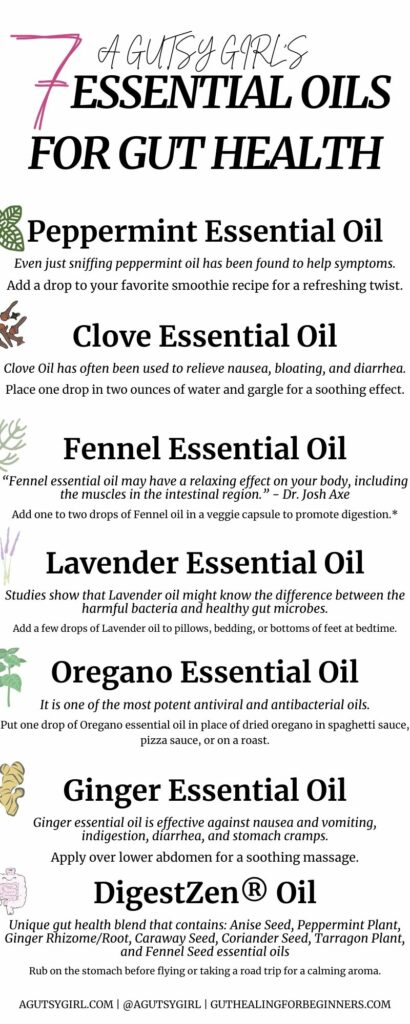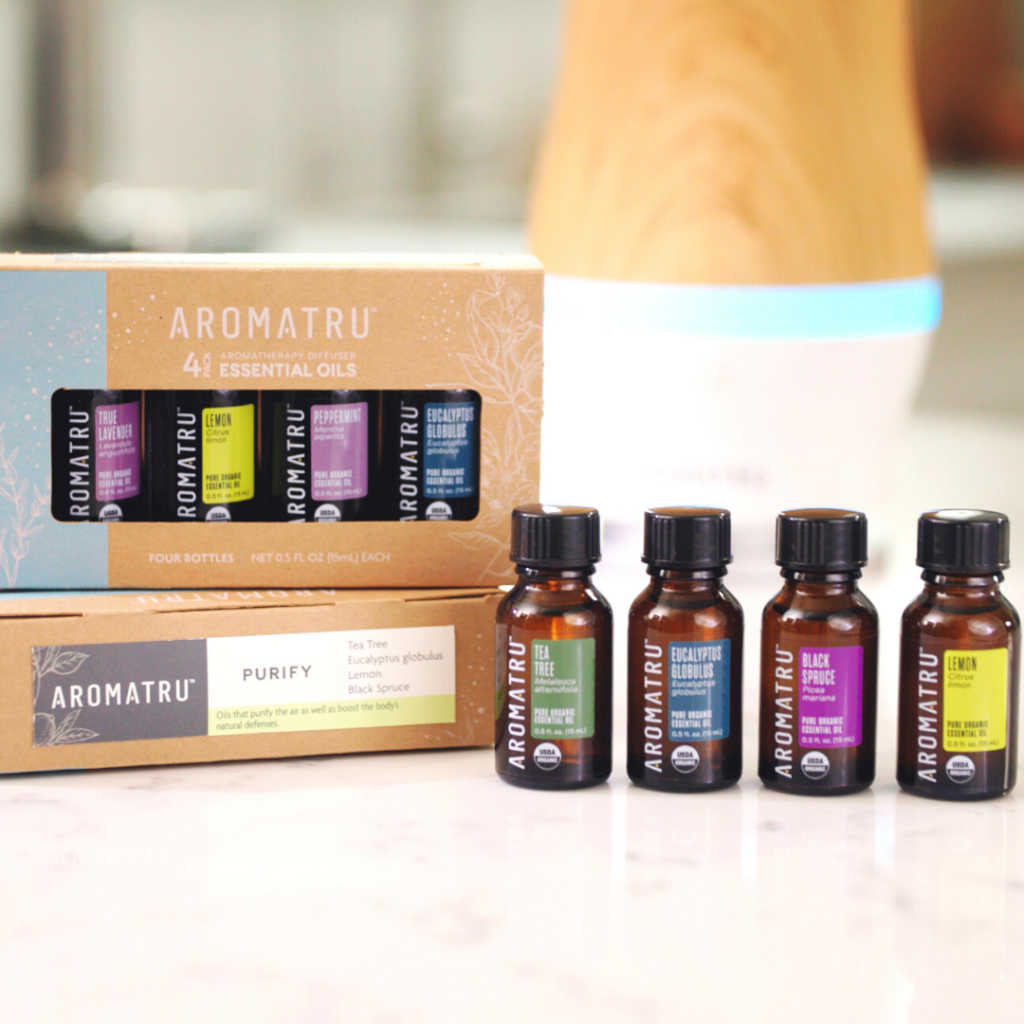Interested in exploring essential oils for gut health? There are 7 essential oils for stomach issues I want to share.
As I’ve been sharing more about my use of essential oils on Instagram, you have been asking,
Which ones are good for gut health and digestive problems?
In full disclosure, I have never really used them for gut health or gut healing. Maybe indirectly, as in, when I breathe essential oils in 24/7 via diffuser, it’s calming and peaceful. But in the sense of adding drops of essential oil to water for a gut-health benefit? No.
And here’s why.
I wasn’t fully sure on how, what to do, which were best, etc.
And I don’t just do things without understanding why I’m doing them – especially when it comes to my gut health.
You shouldn’t either.
But now I have some information ready to share with you.
If you’re having stomach pain and IBS symptoms + gut discomfort like gas, bloating, indigestion or pathogenic overgrowth, essential oils could be helpful.
Very important note: Though you can take some essential oils internally as stated below, please do not just do so haphazardly without consulting a professional. If you want a great website to learn all about using essential oils safely, I recommend checking out THIS one.
7 Essential Oils for Stomach Issues
Click HERE to save these 7 Essential Oils for Stomach Issues for later.

Peppermint Essential Oil
According to once source, “Peppermint oil reduces spasms of the colon and intestinal tract, and it will balance oral and intestinal flora, thereby reducing fermentation of undigested food.”
Peppermint’s stimulating and cooling properties are very effective for digestion, an upset stomach, and different gastrointestinal issues.
Peppermint oil is particularly effective at relieving nausea, whether inhaled, rubbed on the stomach, or taken internally. It relaxes the smooth muscles of your intestines, and helps relieve gas pressure.
Even just sniffing peppermint oil has been found to help symptoms. Capsules of the oil might prove to be much more effective than simply sniffing.
Because of peppermint’s ability to refresh, stimulate, tone, and settle the gastrointestinal system, it is the “ultimate internal body workout”.
Ways to Use Peppermint Oil
Uses
- Use a drop of Peppermint oil with Lemon oil in water for a healthy, refreshing mouth rinse.
- Add a drop to your favorite smoothie recipe for a refreshing twist.
- Place one drop of Peppermint essential oil in the palm of hand with one drop Organic Sweet Orange oil and one drop Frankincense oil and inhale for a mid-day pick-me-up.
Directions for Use
- Diffusion: Diffuse using the AromaTru Diffuser.
- Internal use: Dilute one drop in 4 fl. oz. of liquid.
- Topical use: Apply one to two drops to desired area. Dilute with a carrier oil to minimize any skin sensitivity. See additional precautions below.
Clove Essential Oil
Clove oil is a powerful antibacterial and anti-fungal oil, making it ideal for treating stomach illness and pathogenic overgrowth.
Like peppermint, this essential oil relaxes the intestinal smooth muscle. It also calms inflammation within the gut lining and reduces intestinal spasms. It has often been used to relieve nausea, bloating, and diarrhea. For these reasons, it is useful against harmful gut bacteria like E. coli and pathogenic yeast such as Candida albicans.
Recent findings in a peer-reviewed scientific journal demonstrate that eugenol, the chief component of Clove essential oil, assists the body in maintaining normal gastrointestinal motility even during times of stress.* The authors theorize that eugenol acts on stress-responsive regions of the brain, promoting balanced levels of stress-response hormones that are released throughout the body, which helps keep the gastrointestinal tract functioning properly.*
Eugenol is also a strong anti-fungal for internal yeast infections.
Ways to Use Clove Oil
Uses
- Add one drop of the home teeth whitening to toothpaste to clean teeth and gums.
- Place one drop in two ounces of water and gargle for a soothing effect.
Directions for Use
- Diffusion: Diffuse using the AromaTru Diffuser.
- Internal use: Dilute one drop in four fluid ounces of liquid.
- Topical application: Dilute 1 drop essential oil to 10 drops carrier oil (like jojoba oil). See additional precautions below.
Fennel Essential Oil
With several health benefits dating back to ancient Rome, Fennel essential oil can still be used internally to promote healthy digestion, while exuding a unique licorice aroma and flavor.
Dr. Josh Axe says it reduces and prevents spasms in the gut. “Fennel essential oil may have a relaxing effect on your body, including the muscles in the intestinal region.”
Fennel oil also fights free radical damage and provides antimicrobial activity against some strains of bacteria and pathogenic fungi.
There are many science-based benefits of fennel, inflammation reduction and antibacterial properties are two of them.
If you’ve ever heard to cook with more fennel and/or chew on fennel seeds for better digestion, this should make perfect sense.
Ways to Use Fennel Oil
Uses
- Add a drop of oil in water or tea when craving sweets.*
- Add one to two drops of Fennel seed oil in a veggie capsule to promote digestion.*
Directions for Use
- Diffusion: Diffuse using the AromaTru Diffuser.
- Internal use: Dilute one drop in four fluid ounces of liquid.
- Topical use: Apply one to two drops to desired area. Dilute with Fractionated Coconut Oil to minimize any skin sensitivity.

Lavender Essential Oil
Lavender oil is perhaps the most popular scent employed in aromatherapy, known for its ability to relax the mind and soul.
It is also a great antiseptic. Good for cuts, scrapes, and burns (due to its anti-inflammatory properties), it may be used alone but is commonly combined with tea tree oil or aloe gel.
This essential oil is very useful for a wide variety of issues and is also budget-friendly. Unlike other essential oils, lavender oil doesn’t appear to harm beneficial gut bacteria.
Essential oils are powerful plant medicine with highly-concentrated properties. Like prescription antibiotics, the oils do not know the difference between pathogenic bacteria and healthy gut bacteria.
However, studies show that Lavender oil might know the difference between the harmful bacteria and healthy gut microbes.
The most selectively acting oils were Carum carvi, Lavandula angustifolia, and Trachyspermum copticum, which inhibited the growth of potentially pathogenic organisms such as Bacteroides fragilis, Candida albicans, and Clostridium spp., at concentrations that had no impact on either species of lactobacilli or bifidobacteria or the majority of other colonic organisms. (source)
- Carum carvi = Caraway
- Lavandula angustifolia = Lavender
- Trachyspermum copticum = Ajowan
Just as Lavender can cool down an agitated toddler when diffused in a room, or get you ready for a massage, it can even relax your bowel inflammation.
Ways to Use Lavender Oil
Uses
- One of the most common uses is to add a few drops of Lavender oil to pillows, bedding, or bottoms of feet at bedtime.
- Keep a bottle of Lavender oil on hand to soothe occasional skin irritation.
- Freshen your linen closet, mattress, car, or the air by combining Lavender essential oil with water in a spray bottle.
- Use in cooking to soften citrus flavors and add a flavorful twist to marinades, baked goods, and desserts.
Directions for Use
- Diffusion: Diffuse using the AromaTru Diffuser.
- Internal use: Dilute one drop in 4 fl. oz. of liquid.
- Topical use: Apply one to two drops to desired area. Dilute with a carrier oil to minimize any skin sensitivity. See additional precautions below.
Oregano Essential Oil
If you’ve ever smelled Oregano oil, you know its potency. It is one of the most potent antiviral and antibacterial oils.
Because of this, oregano oil is used for various digestive health issues, including SIBO (small intestine bacterial overgrowth).
Oregano oil contains two compounds carvacrol and thymol that make it antibacterial and antiviral, respectively. In particular, these compounds make oregano oil a robust weapon against bacterial infections (such as E. coli), fungal infections (such as Candida), and parasites.
Dr. Nirala Jacobi has a great SIBO MasterClass presentation which includes an entire slide on oregano. You can see it HERE.
Ways to Use Oregano Oil
Uses
- Take one drop of Oregano oil in a veggie cap or 4 fl. oz of liquid daily to maintain healthy immune system function.*
- Add one to two drops to a vegetable oil capsule to support healthy respiratory function.*
- Put one drop of Oregano essential oil in place of dried oregano in spaghetti sauce, pizza sauce, or on a roast.
- Put 10 drops in a 16-ounce spray bottle with water for a surface cleaner.
Directions for Use
- Diffusion: Diffuse using the AromaTru Diffuser.
- Internal use: Dilute one drop in 4 fl. oz. of liquid.
- Topical use: Dilute 1 drop essential oil to 10 drops carrier oil. See additional precautions below.

Save big when you purchase these high-quality essential oils through AromaTru + A Gutsy Girl.
Ginger Essential Oil
Ginger root has been used as a natural remedy for digestive issues throughout history, so it’s no surprise that ginger essential oil would be one of the top oils for gut health.
In fact, the Chinese and Indians have been using it for over 4,700 years!
Ginger essential oil is effective against nausea and vomiting, indigestion, diarrhea, and stomach cramps. Although the “gut” is technically the intestines, digestive trouble often starts long before food makes it to the intestines causing physical stomach problems.
One 2017 study assessed the effectiveness of inhaling ginger oil to relieve postoperative nausea following abdominal surgery. Investigators found that participants that had inhaled ginger oil rated their levels of nausea and vomiting lower than those in the placebo group.
Ways to Use Ginger Oil
Uses
- During a long car ride, diffuse or place a drop of ginger in the palm of your hand and inhale to negate motion sickness.
- Apply over lower abdomen for a soothing massage when you have abdominal pain.
- Use Ginger essential oil in your favorite sweet and savory dishes.
Directions for Use
- Diffusion: Diffuse using the AromaTru Diffuser.
- Internal use: Dilute one drop in four fluid ounces of liquid.
- Topical use: Apply one to two drops to desired area. Dilute with Fractionated Coconut Oil to minimize any skin sensitivity.
DigestZen® Oil
This is doTERRA’s unique blend created just for digestion and the digestive tract.
Even though this might be the most relevant essential oil for you, I saved it for last because it includes a combination of three of the oils from above: peppermint, fennel and ginger.
Here is the full ingredient list for the blend:
Anise Seed, Peppermint Plant, Ginger Rhizome/Root, Caraway Seed, Coriander Seed, Tarragon Plant, and Fennel Seed essential oils
This essential oil blend has gut health implications.
DigestZen is a wonderful companion to aid in the digestion of food, soothe occasional upset stomachs, and reduce uncomfortable gas when used internally.*
doTERRA gives the following DigestZen® Oil uses + directions
Uses
- Add a few drops to water to take internally.*
- Rub on the stomach before flying or taking a road trip for a calming aroma.
- Take DigestZen internally when traveling or trying new foods to soothe occasional stomach upset.*
- Add to water or tea to maintain a healthy gastrointestinal tract.*
Directions for Use
- Diffusion: Diffuse using the AromaTru Diffuser.
- Internal use: Dilute one drop in 4 fl. oz. of liquid.
- Topical use:Apply one to two drops to desired area. Dilute with Fractionated Coconut Oil to minimize any skin sensitivity.
Essential Oil Cautions
Due to the high concentration of essential oils, always proceed with extreme caution when self-dosing on home remedies like those found in this article. They are still very effective against digestive complaints even if not ingested.
Essential oils, despite their therapeutic benefits, can cause adverse skin reactions if they aren’t combined with a thicker oil before applying to the skin. In addition, some may be toxic for ingestion. So, make sure you research if the essential oil is toxic to humans.
Lastly, whatever is toxic to humans may be even more toxic to animals. Our four-legged friends have a more sensitive system than us.
As always, if you aren’t sure about an oil, how to use it, and/or its indications and/or contraindications for your personal circumstances, please work with your doctor or other medical practitioner.
* These statements have not been evaluated by the Food and Drug Administration. Essential oils are not intended to diagnose, treat, cure, or prevent any disease, and this is not medical advice. These are simply some of the different ways I have personally found essential oils to aid in a healthy digestive system.
Sources: HERE, HERE, HERE, HERE, and HERE.
AromaTru is the eco-friendly diffuser of choice for the A Gutsy Girl community.

The Best Essential Oils
Due to their explosive growth for many in everyday life, you can find essential oils everywhere.
This does not mean that all essential oils are created equally.
Some things to look for when purchasing these drops of oil:
- Ensure they are non-toxic. There is no point in using essential oils as part of your daily routine for overall health if they are adding to your toxic load. A heavy toxic load negates the potential digestive benefits.
- Check for things like: sustainably sourced, third-party tested, USDA Certified Organic, or Wild-crafted in pristine conditions.
- Rigorously vetted and third-party tested to ensure you’re getting the purest product from plant to bottle.
- “Cheaper” is not always better.
- Note the bottle ingredients, making sure yours are pure essential oils.
If you’re working towards fewer stomach aches and good digestion, give these natural remedies a try.
Let me know in the comments below you’re own experiences with essential oils for digestive discomfort.
If you liked this post on my 7 Essential Oils for Stomach Issues, you might also enjoy:
Xox,
SKH
🤰 bloating be gone! weight loss through optimal gut health for women
💃ʜᴇᴀʟ ʏᴏᴜʀ ɢᴜᴛ. ʜᴇᴀʟ ʏᴏᴜʀ ʟɪfe.
🫶🏻 founder gutbyome.com





![Best Adaptogens Supplements [22 Adaptogens for Hormones]](https://agutsygirl.com/wp-content/uploads/2020/01/medicinal-herb-featured-agutsygirl.com_.png)
